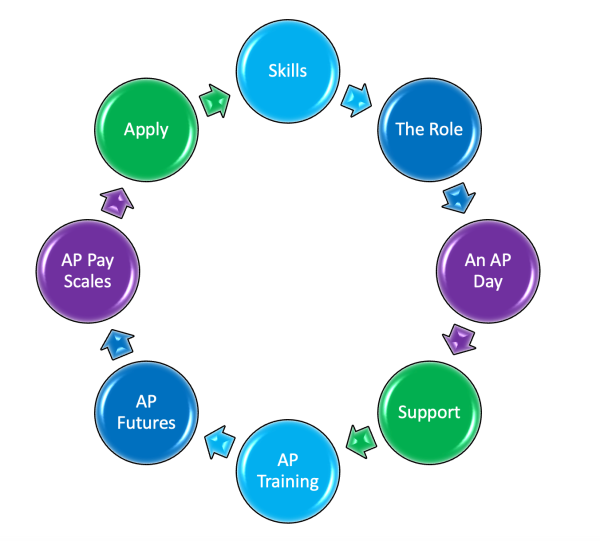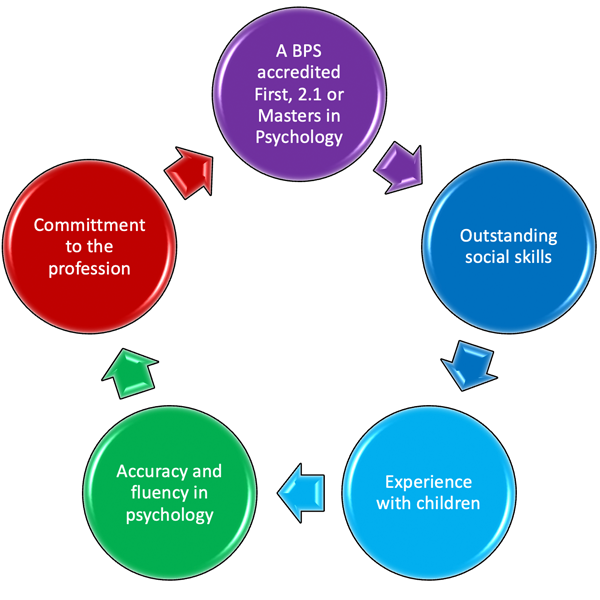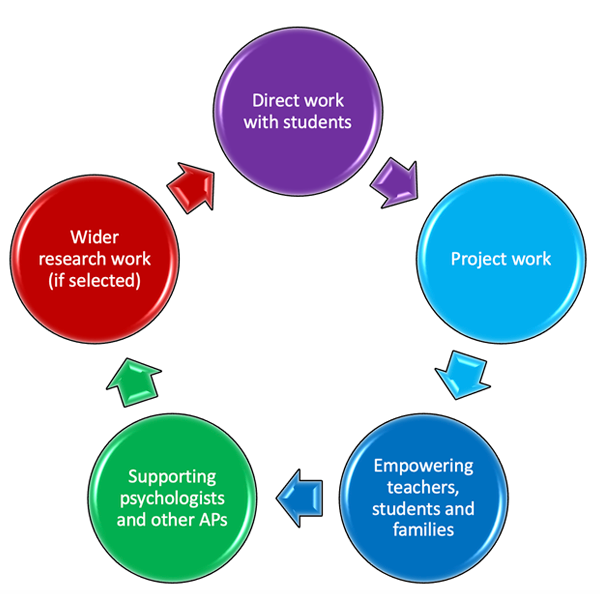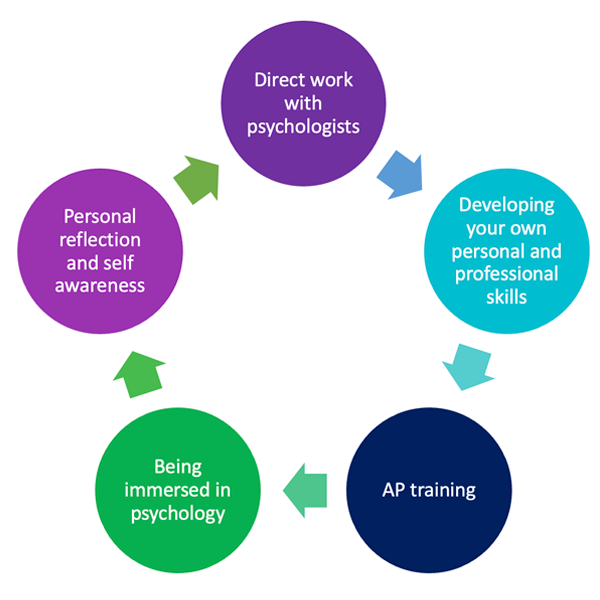Thank you for your interest in becoming an Assistant Psychologist (AP) with EdPsychs.
Once you have read through this page, and if you would like to apply to be an AP with EdPsychs, just press the large purple button at the foot of this page to begin the application process.
In diagrammatic form, this page will cover:

And in written form, this page will cover:
Being an AP with EdPsychs usually requires excellent reading and reading comprehension skills. However, we have had APs in the past with dyslexia and reading needs, and they have:
And you may find this helpful too. Likewise, in your written application you can make video answers for each question if you find writing difficult.
We hope this helps.
You will need ALL of the following to become an AP with EdPsychs:

And in more detail:
APs work under the direct guidance and supervision of an Educational Psychologist (EP) or a Clinical Psychologist (CP), and they help the psychologists support schools, parents, children and students on an ongoing basis. The AP role includes:

And in more detail:
EdPsychs employ a team of APs to fulfil this role, and each AP works full-time in one school for at least one academic year, and most APs progress onto a second and third year with EdPsychs.
Although the core of each AP role is similar, each AP is matched to a school and there are different elements to the AP role and this can include:
Direct work with students
Project work in schools
This will be different for different APs in different schools, but at present APs in the company are working to support and run psychologist's projects on:
An AP, Senior AP or Principal AP will also often work in other roles based on the specific needs and requirements of their assigned school. This year this has included:
Empowering teachers, students and families
These are very much school specific programmes based on the needs of the school community. They can include APs supporting:
Supporting psychologists and other APs in the company
The company runs a nine layers of support model. This is aimed at providing:
Within these contexts each AP takes responsibility for managing and contributing to their own support structures. These include:
There are five major parts to the EdPsychs AP role.

Direct work with psychologists
Psychologists and APs work together as colleagues to:
As part of this process, APs learn both how to become an AP, but, perhaps more importantly, how to become a future psychologist.
With respect to becoming a future psychologist, APs:
Developing your own personal and professional skills
APs at EdPsychs are often surprised at their own rate of learning and personal and professional development in their time with the company.
Every AP at EdPsychs is on a story arc and a development curve, and the psychologists within the company co-operate to talk through an APs learning curve, and how they can better support this. APs also learn from:
AP training with EdPsychs
EdPsychs training is training that is designed to be applied, used and evaluated. EdPsychs training is psychological.
We build our training days to create deep processing, reflection and personal, professional and psychological development, and they are role model sessions that you can take on into your future work in schools and into your future career.
An EdPsychs training day has a number of parts:
We place a lot of value on our direct AP training.
We base our AP doctoral references and evaluation of AP story arcs on it, and they are based on:
You can see this year’s AP training structure here.
Being immersed in psychology
Being an AP at EdPsychs means that you are immersed in 21st century psychology. APs from EdPsychs:
Personal reflection and self-awareness
Being part of a large, dynamic psychology service has a number of benefits with respect to your own personal reflections and self-awareness. Specifically, you can:
We have different types of AP roles (and the salaries shown are based on April 2023 pay scales, and these will be updated in April 2024 after the new government budget is announced).
First Year APs: Assistant Psychologists in their first year work with the company in term time only (39 academic weeks of the year). As such this is a 0.75 contract which is paid at £22,693.33 a year pro rata (which means that a first year AP earns £17,020 for these 39 weeks of work in term time only).
As these are 0.75 contracts, APs are allowed to have other forms of income as long as there is no conflict of interest with an EdPsychs’ AP role, and they are available to support schools in core hours (usually 9am-4pm in term time, but APs can negotiate exact working hours with their host school). Our client schools expect almost all AP work to be direct in the school.
Many APs also do personal tutoring, research and additional jobs in the school holidays.
Second Year APs: After one year with the company, we may offer you a Senior Assistant Psychologist role. Senior Assistant Psychologists earn £25,000 a year pro-rata (which equates to £18,756 for 39 weeks in term time only).
Senior APs can also work on company projects. These are 100 hour projects and first year APs (who have agreed to do a future Senior role) and Senior APs need to apply internally for these roles in June of each year, and they are paid at Senior AP rates.
Again, as these are 0.75 contracts, Senior APs are allowed to have other forms of income as long as there is no conflict of interest with an EdPsychs’ AP role, and they are available to support schools in core hours (usually 9am-4pm in term time, but Senior APs can negotiate exact working hours with their host school). Again, our client schools expect almost all AP work to be direct in the school.
Many Senior APs also do personal tutoring, research and additional jobs in the school holidays.
August 30th 2024 AP starting dates:
April 2024 roles:
School locations
We will have AP roles this year (2024-2025) in Croydon, Dagenham and Redbridge, Greenwich, Harringay, Harrow, Hillingdon, Kent, Lambeth, Richmond, Slough, Southwark, Sutton and Watford.
These are in a range of primary, secondary and specialist schools.